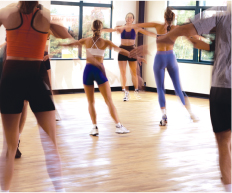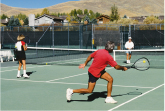Exercises, yes or no?
For decades physical exercise and sports were discouraged for allergy and asthma sufferers, especially among children and young adults. Exercise, is an important activity for everyone, including patients who have asthma or other allergic disorders. It will help them to feel their best, both physically and psychologically.

+ For many people, vigorous exercise can trigger bronchial spasms and a tight chest. Working out can also cause different symptoms such as accelerated heart rate, coughing, stomach pains and chest pains that occur five to ten minutes after beginning physical exercise. This happens especially when you exercise outdoors in cold, dry weather, important factors that can worsen symptoms because the respiratory system loses heat. Air pollutants (sulfur dioxide), high pollen concentrates and viral infections in the respiratory system can increase the probability and severity of attacks induced by exercise.
BENEFICIAL SPORTS
Swimming is considered the best sport for allergy and asthma suffers. Swimming involves breathing warm and moist air and is often well tolerated. You can do this exercise all year round. In fact, it builds up the lung capacity and muscle tone of the diaphragm, much like breathing exercises. Swimming, due to the warm, humid environment, the toning of the upper body muscles, and the horizontal position (which may actually loosen mucus from the bottom of the lungs), can be very beneficial. Other recommended activities include sports that use short spurts of exertion or less vigorous exercises such as baseball, karate, wrestling, long distance running, short distance running, golf, walking, jogging and low impact aerobics.

SPORTS YOU SHOULD AVOID
Cold-weather activities, such as skiing and ice hockey, often trigger an attack or continuous vigorous exercises (basketball, field hockey, tennis or soccer) are more likely to induce bronchial spasms.

OTHER USEFUL TIPS
- • Make sure you're properly warmed up. Five to ten minutes of stretching or light exercise can help relax and open up your airways.
- • Exercise only when you're free of any viral respiratory infections, such as a cold. Avoid exercising when pollen or air pollution levels are high or in cold weather.
- • If inhaling air through the mouth, keep the mouth pursed (lips forming a small “O” close together), so that the air is less cold and dry when it enters the airways during exercise.

Comment about this article, ask questions, or add new information about this topic: